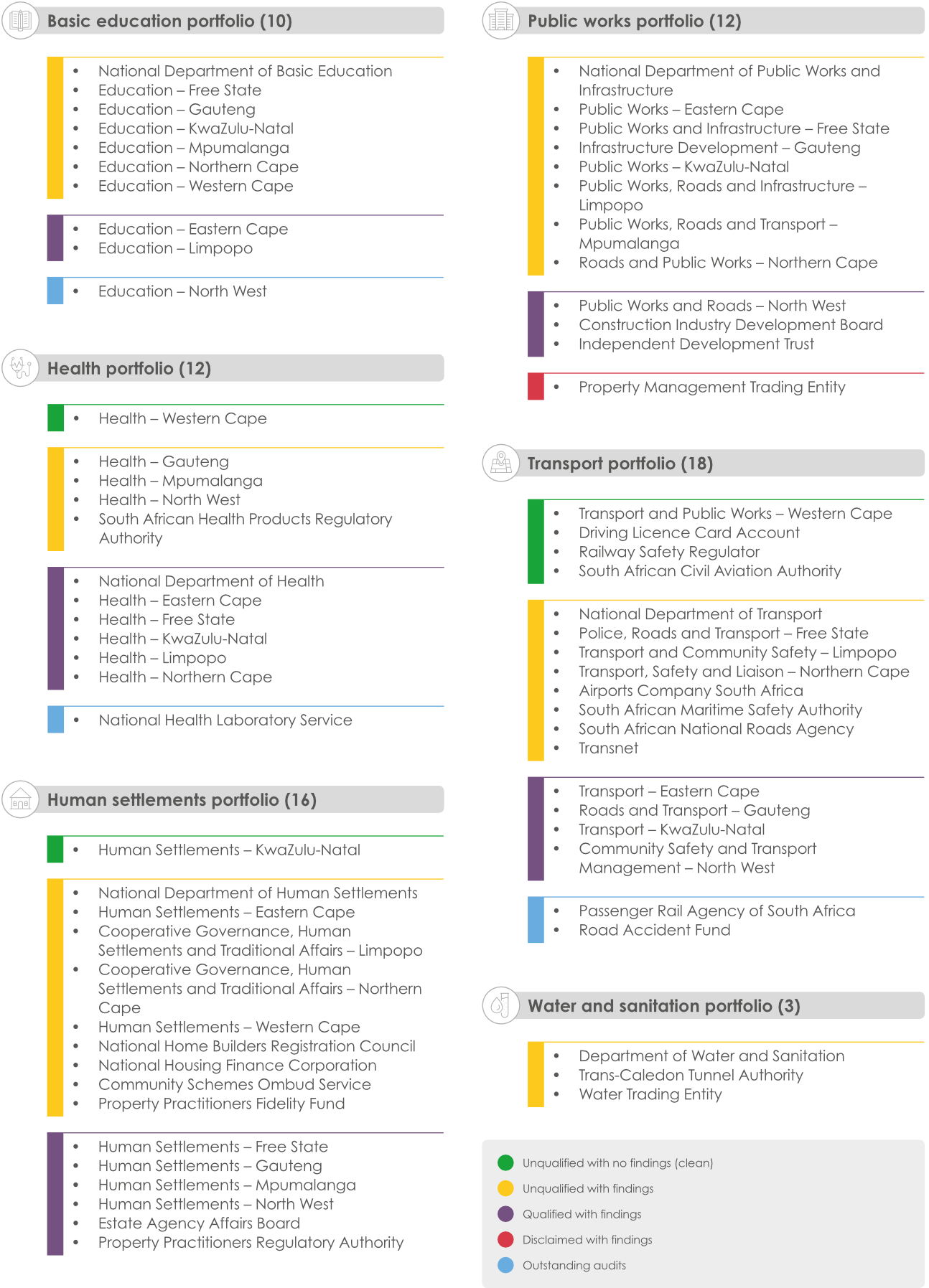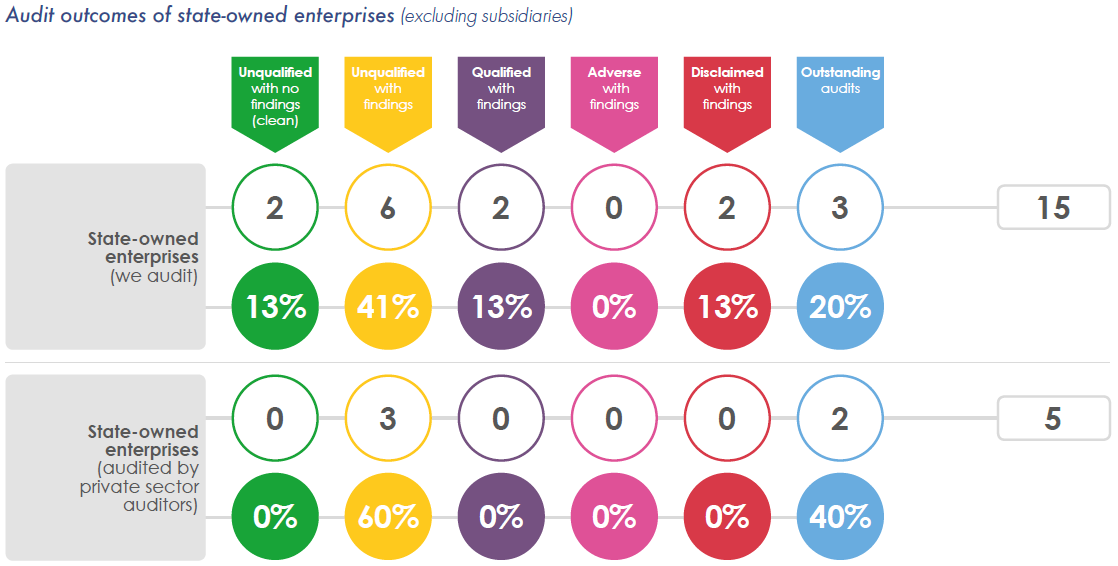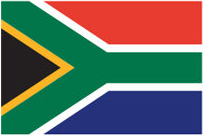State of national and provincial government
Audit outcomes
Audit outcomes are based on our audits of the quality of financial statements and annual performance reports, as well as compliance with key legislation.
In 2021-22, accounting officers and authorities managed an estimated expenditure budget of R2,58 trillion – the budget amount includes all operating and capital expenditure budgets of departments and public entities as obtained through the audit process.
The audit outcomes have shown a gradual upward trend since the previous administration’s term ended. Overall, 114 auditees now have a better audit outcome than in 2018-19, with 46 having a worse outcome – an overall net improvement in the outcomes of 68 auditees (17%).
Audit outcomes
Overall, the audit outcomes of both departments and public entities have improved from 2018-19. Based on the completed audits of 160 departments, 47 departments had improved and 12 had regressed – a net improvement of 35 (22%). Similarly, of the 238 public entities with completed audits, 67 had improved and 34 had regressed – a net improvement of 33 (14%).
By 15 September 2022 (the cut-off date for audit outcomes to be included in this report), we had not yet completed the audits of 26 auditees. Fifteen of these auditees (58%) – most of them state-owned enterprises – had not yet submitted their financial statements at this date. We elaborate on the worrying trend of late submissions by state-owned enterprises later in this report. Six of the auditees (23%) submitted their financial statements late, which delayed the completion of their audits. The remaining five outstanding audits (19%) were also delayed by the auditees for different reasons.
When an auditee receives a clean audit opinion, it means that its financial statements and annual performance report give a transparent, honest and credible account of its finances and its performance against set targets. In other words, these accountability reports present a reliable picture of that auditee’s performance – whether good or bad. This enables everyone with an interest in the auditee – particularly those who need to oversee the auditee’s performance and provide support for it to succeed – to judge how the auditee is doing and to take action where necessary. A clean audit opinion also means that the auditee complied with the important legislation that applies to it and, where transgressions did occur, they were rare or not material.
A clean audit is not always an indicator of good service delivery. However, we have seen that auditees that have the controls and systems in place to plan, measure, monitor and account for their finances and performance, and to stay within the rules, often also have a solid foundation for service delivery that will benefit the people of South Africa.

The number of clean audits increases every year due to significant effort and commitment by the leadership, officials and governance structures of these auditees. However, the 128 auditees (56 departments and 72 public entities) with a clean audit status represent only 6% of the R2,58 trillion expenditure budget managed by national and provincial government.
It is often difficult for an auditee to sustain a clean audit if it does not have financial and performance management systems that operate consistently and effectively and controls that are embedded properly. We commend the 69 auditees (54%) that have managed to retain their clean audit status since the last year of the previous administration. Some of the common practices enabling them to do so are institutionalising and monitoring key controls (including preventative controls), as well as having all assurance providers (including management and leadership) committed to fulfilling their monitoring, governance and oversight roles. To avoid regressions, these auditees must continue to apply these best practices.
There are another 30 auditees that are very close to obtaining a clean audit, and only need to address one finding on the quality of their financial statements (18 auditees) or performance reporting (12 auditees). For instance, the Mpumalanga Department of Economic Development and Tourism had only one finding on material misstatements in the submitted financial statements.
Some of these auditees have been working towards this goal for many years and we encourage them to persevere in overcoming the last hurdle. If they manage to do so, we expect to see an increase in the number of clean audits for 2022-23.
In our previous general reports, we consistently highlighted the need to pay specific attention to the key service delivery departments and state-owned enterprises, because they have the greatest impact on service delivery and government’s financial health. Their audit outcomes are a good indicator of their ability to fully discharge their mandates.
This year, our messages also extend to national public entities included in the key service delivery portfolios, as well as additional portfolios, including basic education, health, human settlements, public works, transport, and water and sanitation.
Our reflections on the outcomes of state-owned enterprises include the five (at group level) audited by private sector auditors in accordance with section 4(3) of the Public Audit Act, namely Air Traffic and Navigation Services, Alexkor, Broadband Infraco, Eskom, and the Industrial Development Corporation.
We report on all subsidiaries of the 15 state-owned enterprises we audit.


We show the audit outcomes of state-owned enterprises and the subsidiaries we audit below:

The key service delivery portfolios and state-owned enterprises are responsible for more than 30% of the expenditure budget, but consistently have the worst outcomes. Auditees from these groups account for 58% of the outstanding audits and 31% of the modified audit opinions (qualified, adverse and disclaimed). We unpack the results from our audits of these important auditees later on in this report, and also look at their planning, reporting, and infrastructure and service delivery, as well as their impact on government finances and the lives of the people of South Africa.
Other pages in this section:
Other pages in this section:

